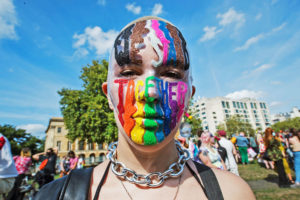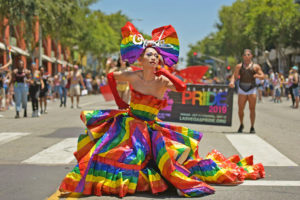As a gay man — I know that awful phrase is usually followed by irrelevant twaddle, but please bear with me. As a gay man, I have always found heterosexuality quite fascinating. I have made something of an unconscious study of it. I remember going to house parties, as a teenager, where my heterosexual peers would divide across the room, boys one side and girls the other, and then gradually pair off to fumble in corners to the mating call of Spandau Ballet. I felt like David Attenborough lurking in the undergrowth or a birdwatcher in his hide, excitedly whispering “And now the spawning begins!” and jotting down copious notes in a tattered exercise book.
Back then, heterosexuality looked as easy as falling off a log. They say that onlookers see most of the game, and I found the push and pull of it all, the simple animal processes overlaid by human sophistications, endlessly interesting. I still do.
Today, though, heterosexuals are an endangered species. A recent survey uncovered that 21% of young adults (born between 1997 and 2003) in America identify as “LGBTQ+”. It also reported the frankly incredible stat that the number of self-identifying non-heterosexuals in the American population as a whole has doubled since 2012, from 3.5% to 7.1%.
It is, of course, vanishingly unlikely that a fifth of a population has turned spontaneously away from heterosexuality overnight. The rise of the insubstantial concepts of TQ+, which have little to do with sexual orientation but have been bolted on to LGB for some reason, obviously accounts for some of this. “Queer” is a particularly slippery category; it now seems to include anything from straight chaps wearing eyeliner to straight girls dyeing their hair shocking pink. Thus, it has elevated attendees of a Rocky Horror night or a Depeche Mode concert to the status of a persecuted minority.
But still, the survey finds that 57% of the respondees (of all ages) claiming to be non-hetero say they are bisexual. So, either this was always the case, but people concealed their sexuality due to social stigma. Or — and this is the far more likely scenario, in my opinion — heterosexuals are becoming socially embarrassed by their heterosexuality and trying not to be déclassé.
The reason I believe this is the more likely scenario is that heterosexuality, among the great and the good, now seems more fraught than being bisexual did a decade ago. The grim academic neologism “heteronormativity”, thanks to Tumblr and Twitter, is everywhere. The last few days are representative: Trisha Greenhalgh, a Professor of Primary Care and a member of independent SAGE, exhorting her followers to avoid “preaching heteronormativity”; an Indonesian magazine telling its readers that heteronormativity was the creation of Dutch colonialism; and Dr Nick Gah of Harvard stating that history isn’t called “herstory” because — well, you’ve guessed it. (This will come as a surprise to anybody who knows the Greek word histor meaning witness).
The powerful organs of the LGBTQ+ movement have spent the last decade saying, “let’s end stigma, break taboos, and stop judging”. What this actually means is “let’s move stigma, place taboos around other things, and carry on judging people but for different reasons”.
Who would want to be “normative”, when you can catch a little of the glamour previously hoarded by the gays? A “normative” identity is increasingly seen as ethically dubious in the West; to be socially acceptable, to gain cachet and status, people have to identify as some kind of minority. Race is increasingly rigidly policed and culturally segregated, with white people cast as original sinners because of what they look like. But fear not! Anybody can identify into some spicy high-status oppression at the drop of a rainbow-striped Stetson by claiming to be non-heterosexual, no questions asked.
At the further end of the culture, prominent heterosexuals such as Laurie Penny, Jameela Jamil and Demi Lovato now all claim to be “queer”. Heterosexuality now carries such low status, in their bananas world, that they’ve felt the need to disavow it.
There are further incentives for people to identify as non-hetero in Hollywood, the arbiter of our culture. Take the bizarre new “representation” quota for eligibility at the Oscars — where at least 30% of characters in a film must come from “underrepresented minority groups” or a main storyline must revolve around such groups or it won’t even be considered for an award. It would strike dead most of human culture accrued over millennia, but actors and writers must now obey this peculiar edict or lose their careers.
It’s all deeply patronising, and borderline homophobic. There is a kind of fetishisation of non-hetero relationships going on here, an element of voyeurism not much different from straight girls who kiss each other at parties to get the boys’ attention. It is also artistically crass. It means that unalloyed heterosexuality can never be depicted, and has a trickle-down effect of making it culturally unacceptable.
It’s no coincidence that all this is happening where #MeToo came to a head — making heterosexuality seem not only embarrassing but frankly dangerous. But Hollywood is also representative of a wider social movement.
Beneficial changes in material conditions in the West have led, paradoxically, to increased angst and the sexes being increasingly wary of each other. So #MeToo plus the atomisation of social life, plus the grim commodification of reproduction and romantic love, plus the problematisation of male sexual desire for women and its expression have made heterosexuals of both sexes neurotic, jumpy and hyper-vigilant. It could be another factor in the so-called Sex Recession among Gen Z; the number of high school students in America having sex has dropped from 54 to 40% since 1991.
Every society has regulations and social standards around heterosexuality, often wildly variant. Ours have changed with dizzying rapidity. One might feel almost nostalgic for something as asinine as “Men Are From Mars, Women Are From Venus”. At least that didn’t come laden with drear politics and sweaty-palmed suspicion.
Let me be clear, I’m not blaming heterosexuals for their current predicament; I am blaming the culture that’s increasingly scattering obstacles in their path. When I encounter a functioning straight couple nowadays, I want to cheer.
Because at a very basic level, heterosexuality is of major importance, as the great motor of humanity. Without it, nobody would exist. It is a responsibility and (I’ve observed) a great joy, to rear and to effectively socialise children. The devaluation of parenthood — and of stable heterosexual coupling — across the West has had serious social consequences, exacerbated by bad economic decisions taken by Western governments. It has become increasingly financially difficult to raise kids — the ONS reported in 2020 that the English fertility rate had reached its lowest recorded level — which should be the easiest thing in the world.
It is deeply foolish to ignore or wish away the material reality, and the importance, of heterosexuality, and wrong to judge different kinds of straight relationships entered into by choice. There is nothing wrong with traditional straight couples and nothing wrong with progressive straight couples. They don’t matter more than the rest of us, but they matter in a different and significant way. And they are, let us not forget, the majority.
Shame about innocuous things is dangerous. As a gay man (sorry) who came of age in the Eighties, I know that only too well. It should not be so boring or gauche to be heterosexual that people are desperate to deny it. So let us have more heteronormativity and end the stigma. Take it from a homosexual, you’re just fine as you are.
Disclaimer
Some of the posts we share are controversial and we do not necessarily agree with them in the whole extend. Sometimes we agree with the content or part of it but we do not agree with the narration or language. Nevertheless we find them somehow interesting, valuable and/or informative or we share them, because we strongly believe in freedom of speech, free press and journalism. We strongly encourage you to have a critical approach to all the content, do your own research and analysis to build your own opinion.
We would be glad to have your feedback.
Source: UnHerd Read the original article here: https://unherd.com




